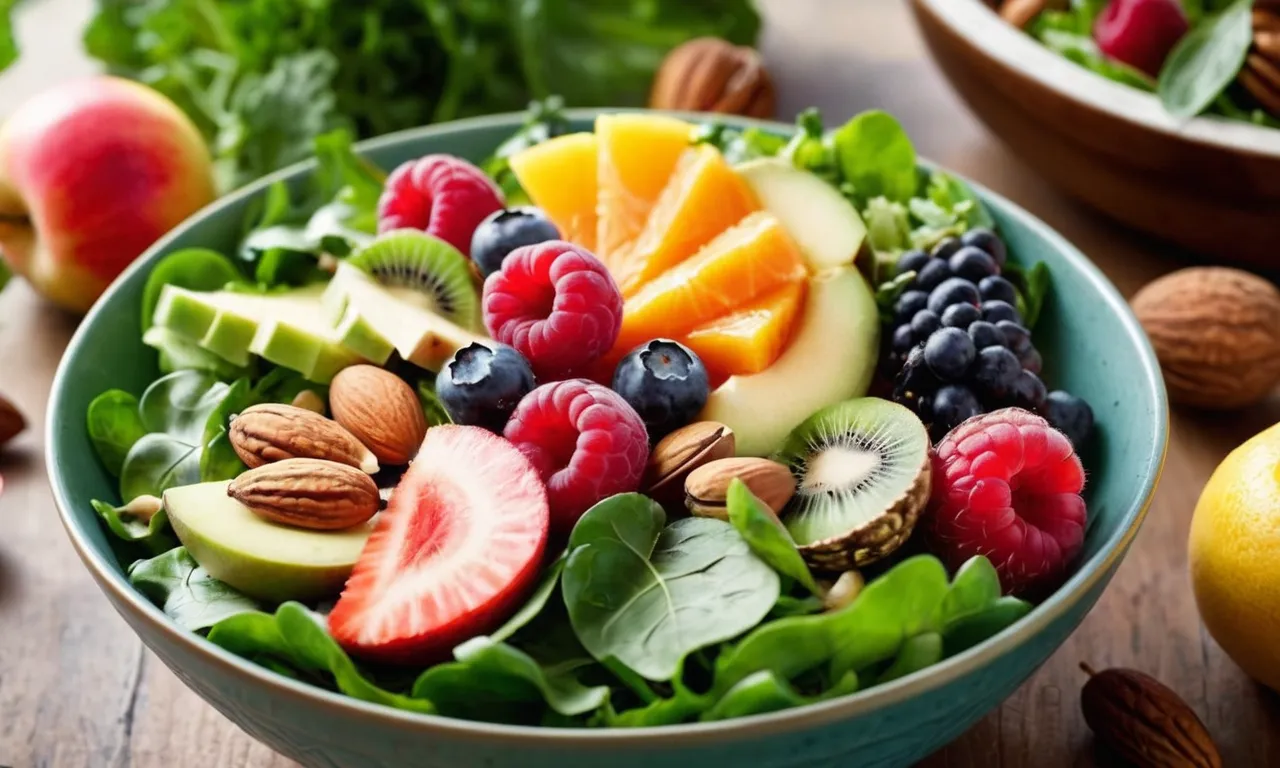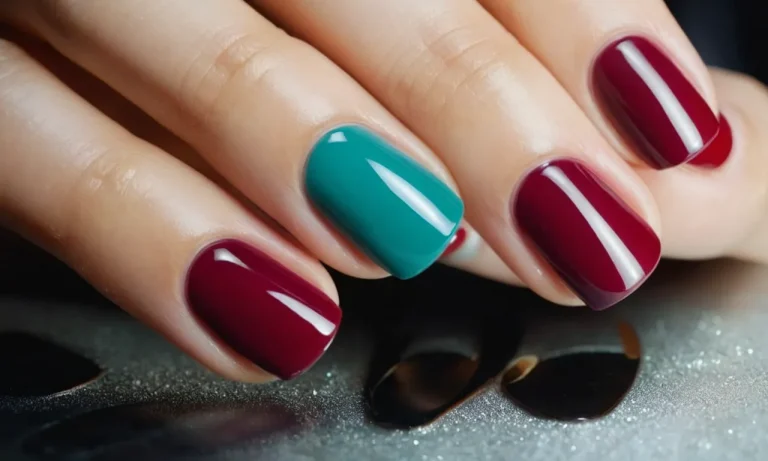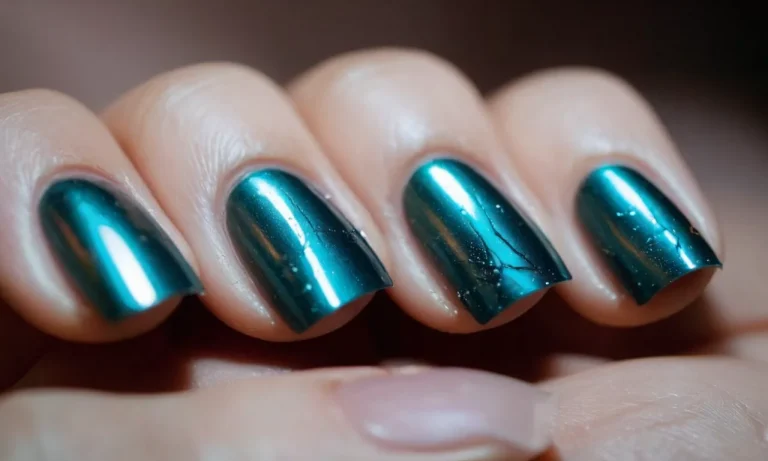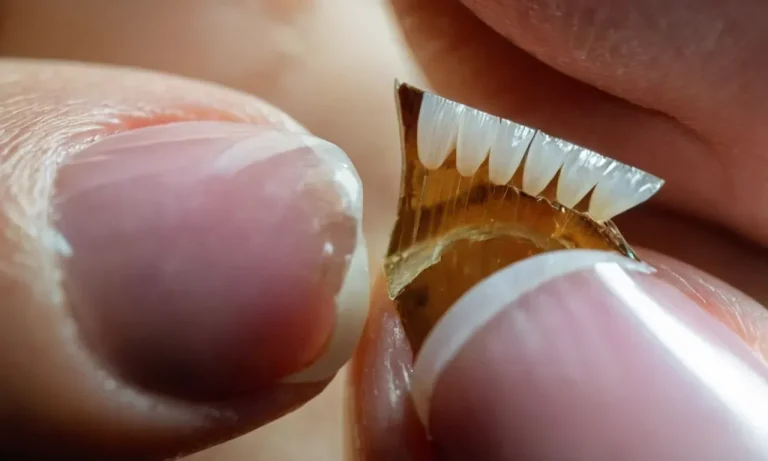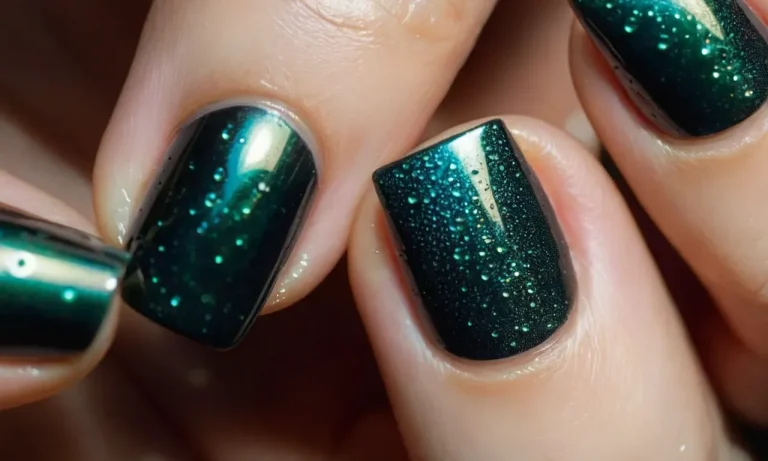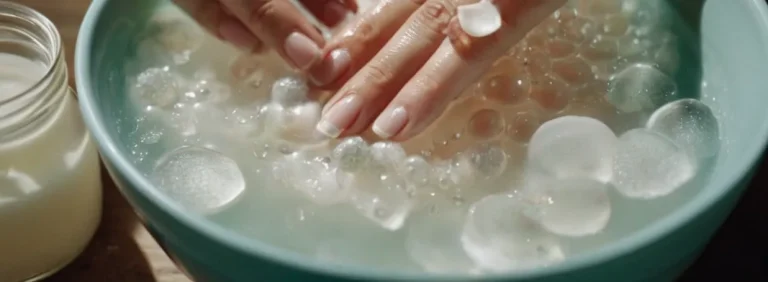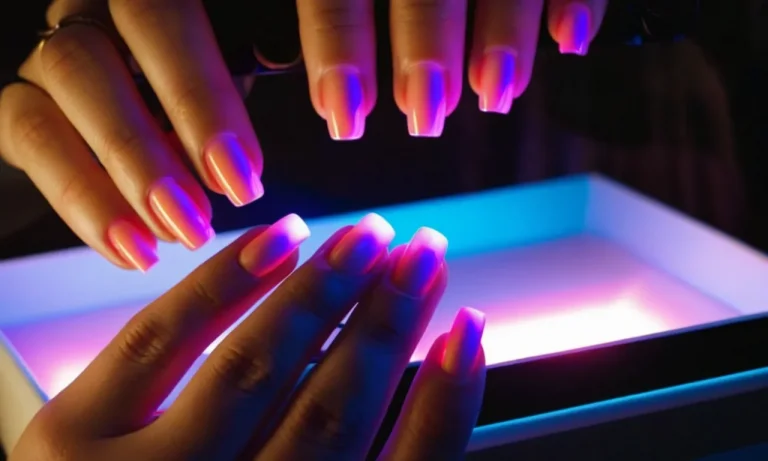Foods That Are Good For Hair And Nails: Your Complete Guide
Having beautiful, healthy hair and strong nails is important to many people. But did you know that what you eat can have a big impact on the health of your hair and nails? In this comprehensive guide, we’ll explore the top foods that can give your locks and nails a boost.
If you’re short on time, here’s a quick answer to your question: Foods rich in protein, omega-3 fatty acids, iron, zinc, biotin, vitamins A, C, D, and E have been shown to promote healthy hair and nail growth and appearance.
In the following sections, we’ll take a deep dive into the research behind key nutrients for hair and nails. We’ll also provide actionable tips on the best dietary sources for each nutrient and how to easily incorporate them into your routine.
Protein
How Protein Helps Hair and Nails
Protein is crucial for strong, healthy hair and nails. Our hair and nails are made almost entirely of a protein called keratin. Consuming adequate protein gives the body the amino acids it needs to produce keratin and promote hair and nail growth.
Protein also plays a key role in the structure and function of hair follicles. Adequate protein intake enhances follicle health and growth cycles. Follicles that regularly renew themselves result in better hair regrowth and quality.
Best Protein Sources
The best sources of protein for healthy hair and nails include:
- Lean meats like chicken, turkey, and beef
- Fish like salmon, tuna, and mackerel
- Eggs
- Beans, lentils, and legumes
- Nuts like almonds, walnuts, and cashews
- Seeds like pumpkin, chia, and flaxseeds
- Dairy products like milk, yogurt, and cheese
- Soy products like tofu and edamame
- Protein powders like whey and plant-based proteins
These foods provide the essential amino acids, zinc, iron, and vitamins needed for keratin production.
Tips for Adding More Protein
Here are some easy ways to add more protein to your diet for fabulous hair and nails:
- Have eggs, Greek yogurt, or nut butter at breakfast
- Snack on nuts, seeds, cheese, or jerky between meals
- Load up salads with chickpeas, beans, chicken, or fish
- Make a high-protein smoothie with protein powder, milk, yogurt, and fruit
- Choose quinoa or lean meat over simple carbs at dinner like rice or pasta
Consuming around 50 grams of protein daily is recommended. Tracking protein intake or working with a nutritionist can help determine optimal protein needs.
Omega-3 Fatty Acids
Getting enough omega-3 fatty acids is key for lustrous hair and strong nails. These healthy fats provide nourishment that keeps strands resilient and helps nails stay chip-free.
Benefits of Omega-3s
Omega-3s offer a variety of beauty perks. They:
- Moisturize hair follicles for less breakage
- Support scalp health to stimulate growth
- Strengthen nails and cuticles to prevent cracks
Additionally, the anti-inflammatory properties of omega-3s promote general wellness – which lays the foundation for healthy locks from root to tip!
Food Sources of Omega-3s
You can get omega-3 fatty acids from both plant and animal sources. Great options include:
- Fatty fish like salmon, tuna, mackerel, and sardines
- Walnuts, chia seeds, flaxseeds, and hemp seeds
- Fortified foods like eggs, yogurt, milk, and orange juice
Aim for two or more servings per week. Getting a variety helps ensure you meet daily omega-3 needs for beauty benefits.
Supplements
Can’t get enough omega-3s from dietary sources alone? High-quality supplements like fish oil capsules are readily available. Research shows omega-3 supplementation protects hair health and may increase nail thickness over time.
Look for supplements with combined EPA and DHA dosages around 2000 mg per day. And be sure to choose reputable brands that undergo independent testing for purity and freshness!
Iron
Iron’s Role in Hair and Nail Health
Iron plays a vital role in the health and strength of your hair and nails. As an essential mineral, iron helps with the production of keratin – the protein that makes up your hair, nails and skin. Without adequate iron levels, you may experience brittle nails, excessive hair loss and overall poor hair quality.
Iron is responsible for supplying oxygen to your follicles and nail bed. When follicles are properly oxygenated, they are able to stay in the growth phase longer, resulting in better hair growth. The increased blood flow also provides essential nutrients to nourish the hair and nails from within.
Those with iron deficiency are at risk of developing hair loss conditions like telogen effluvium and alopecia areata. Getting enough iron can help prevent and improve these issues. Iron supplements may be recommended in addition to dietary sources.
Iron-Rich Foods to Eat
To maintain healthy iron levels, aim to consume iron-rich foods daily. Here are some of the top dietary sources of iron:
- Red meat – Beef, lamb and pork provide heme iron, which has excellent bioavailability.
- Poultry – Chicken and turkey contain iron, though slightly less than red meat.
- Seafood – Clams, oysters and mussels are particularly high in iron.
- Legumes – Lentils, beans and peas are great plant-based sources.
- Nuts and seeds – Pumpkin, sesame and cashew seeds are iron-rich options.
- Leafy greens – Spinach provides a significant amount of iron per serving.
- Fortified cereals and grains – Look for iron-enriched bread, pasta and rice.
- Dried fruit – Prunes, raisins and apricots contain iron.
Try incorporating a few of these iron foods into your weekly meal plan. Consuming vitamin C foods like citrus, tomatoes and strawberries can also help boost iron absorption.
Iron Absorption Tips
To optimize iron intake from your diet, keep these tips in mind:
- Avoid drinking coffee or tea with meals as the tannins can inhibit iron absorption.
- Cook in cast iron cookware to add small amounts of dietary iron.
- Consider supplementing if blood tests show persistently low iron levels.
- Increase vitamin C intake to boost iron absorption from plant sources.
- Soak beans and grains overnight, then rinse before cooking to reduce phytates that block iron.
Getting screened for iron deficiency is recommended, especially if experiencing hair loss. Work with your doctor or dietitian to ensure you meet daily iron needs through food and supplementation as needed.
Zinc
Zinc’s Importance
Zinc is an essential mineral that plays a vital role in hair and nail health. It stimulates hair follicle recovery and supports healthy hair growth. Zinc also helps produce keratin, a protein that makes up the hair strands, skin, and nails.
Furthermore, zinc repairs damage in the hair cuticles, preventing hair loss, brittleness, and split ends.
Multiple studies have shown that zinc deficiency can lead to hair loss and poor nail quality. According to research from the National Center for Biotechnology Information, zinc supports DNA and protein synthesis in nail bed cells which is crucial for strong nail growth.
Best Sources of Zinc
The top dietary sources of zinc include:
- Oysters and shellfish
- Red meat like beef and lamb
- Poultry such as chicken and turkey
- Beans, chickpeas, lentils
- Nuts and seeds like cashews, almonds and pumpkin seeds
- Whole grains like oats, wheat bran and brown rice
- Dairy products such as milk, yogurt and cheese
It’s best to obtain zinc from whole food sources instead of supplements whenever possible. However, vegetarians may need supplements as plant-based foods contain zinc that is less bioavailable for the body to absorb.
Zinc Supplements
For hair and nails, nutritionists often recommend zinc supplements with copper which work synergistically to support growth. The recommended daily intake is 8-11 mg of zinc for adult women and men. Popular forms of zinc supplements include zinc gluconate, zinc picolinate and zinc citrate.
Research shows zinc supplements can significantly decrease hair shedding and alopecia areata patches in those with deficiency. A study in the journal Dermatology Online also found that people’s nail health improved after taking 220 mg of zinc sulfate daily for 12 weeks.
However, more studies are still needed on using zinc supplements specifically for cosmetic benefits. As zinc competes with iron and copper for absorption, be cautious of getting too much zinc from supplements without medical oversight.
Biotin
How Biotin Helps Hair and Nails
Biotin, also known as vitamin B7 or vitamin H, is an essential nutrient that plays a major role in the health and growth of hair and nails. Here’s how it works:
- Biotin assists in the production of keratin, the main protein that makes up hair and nails. It boosts keratin infrastructure to promote sturdier strands of hair and nails.
- It also increases the rate at which hair and nails grow. Studies show supplements can improve nail thickness by 25% over several months.
- The vitamin helps convert nutrients into energy that feeds hair follicles and nail beds. It keeps these tissues healthy and thriving.
With such benefits for strands and tips, it’s no wonder biotin is regarded as a fountain of youth for hair and nails.
Foods High in Biotin
You can obtain biotin from a variety of everyday foods. Those highest in biotin include:
- Liver and other organ meats – A 3 oz beef liver supplies up to 3x the RDI of biotin.
- Eggs – Especially the yolks which provide 10-25% of the RDI per egg.
- Salmon – A great fish option with about 7% of the RDI per 3 oz serving.
- Nuts and seeds – Almonds, peanuts, pecans, walnuts, and sunflower seeds in particular.
- Avocados – One fruit has around 3-6% of the RDI.
- Sweet potatoes – Half a large baked sweet potato provides 5% of the RDI.
- Spinach and broccoli – These leafy greens contain 2-4% of the RDI per cooked cup.
As you can see, it’s easy to meet your daily biotin needs through food. Those who follow a balanced diet likely require no extra biotin at all.
Should You Take a Supplement?
Biotin deficiency is rare if you regularly eat the foods above. However, supplements may benefit those with:
- Brittle nails
- Hair loss
- A diet high in raw egg whites, which contain an anti-biotin compound
- Digestive disorders that impair nutrient absorption
- Pregnancy, when biotin needs rise
For such cases, ask your doctor if a biotin supplement is recommended. The optimal daily dose is 30-100 mcg. Mega-doses of 10,000 mcg supplements may not yield added benefits.
While biotin alone isn’t a magical fix for everyone, pairing supplements with a nutritious diet and healthy haircare routine can nourish your mane and nails from root to tip!
Vitamin A
Vitamin A Benefits
Vitamin A is an essential nutrient that plays a crucial role in maintaining healthy hair and nails. Here are some of the key benefits of vitamin A:
- Promotes healthy hair growth – Vitamin A helps produce sebum, which conditions the scalp and keeps hair hydrated. It also stimulates hair follicles, promoting normal hair growth.
- Reduces hair breakage – Vitamin A strengthens the hair shaft, making hair less prone to damage and breakage. Its antioxidant properties help protect hair from free radical damage.
- Supports nail growth – Vitamin A is needed for normal nail growth. It helps form the nail plate and maintains nail hydration, preventing brittle nails.
- Protects from infections – Vitamin A helps maintain the health of mucous membranes and skin. This provides a barrier against infections that can cause hair and nail problems.
- Regulates oil production – Vitamin A helps regulate sebum production. Excess sebum can make hair oily and affect hair growth. Too little can lead to dry and brittle hair.
Clearly, getting enough vitamin A is crucial for keeping your hair and nails looking their best. Deficiency can lead to a range of problems like hair loss, dry and flaky scalp, brittle nails and fungal infections.
Dietary Sources of Vitamin A
You can obtain vitamin A from both animal and plant foods. Here are some top dietary sources:
- Beef liver – Just 3 ounces provides 5 times the RDA of vitamin A.
- Sweet potato – An excellent plant source, 1 medium baked sweet potato provides over 100% of the RDA.
- Carrots – One large carrot has over 200% of the daily value for vitamin A.
- Spinach – Cooked spinach is high in vitamin A, with 1 cup providing over 50% of the RDA.
- Cantaloupe melon – 1 cup contains over 100% of the RDA for vitamin A.
- Fortified milk and dairy – Many dairy products have added vitamin A, including milk, yogurt and cheese.
- Eggs – Whole eggs are a good source, with 1 large egg providing 10% of the RDA.
- Apricots – Dried apricots are especially high in vitamin A, with just 1/2 cup meeting over 90% of the RDA.
Consuming a variety of vitamin A-rich fruits, vegetables, dairy and eggs is the best way to meet your daily needs and promote healthy hair and nails from within.
Supplements
While dietary sources are ideal, vitamin A supplements may be recommended in certain situations:
- If you have vitamin A deficiency symptoms like extreme dry skin or night blindness.
- For vegans and vegetarians who may not get enough from diet alone.
- If you have malabsorption issues that impair vitamin A uptake.
- To complement vitamin A-rich foods if your diet is lacking in variety.
The RDA for vitamin A is 700-900 mcg for adults. Most supplements provide around 100% of the RDA in each serving. Look for supplements derived from natural sources like cod liver oil for optimal absorption and benefit.
As vitamin A is a fat soluble vitamin and can accumulate to toxic levels, it’s important not to mega-dose. Speak to your doctor before taking supplements, especially if pregnant or breastfeeding.
Vitamin C
Vitamin C’s Role
Vitamin C plays a crucial role in collagen production, which is a structural protein found in hair and nails. Our bodies require vitamin C to synthesize collagen and build strong connective tissues (Source). Without enough vitamin C, collagen production slows down, leading to brittle nails and hair.
In addition, vitamin C is a powerful antioxidant that protects hair follicles from damage caused by harmful molecules called free radicals. These unstable molecules are produced in the body during normal metabolism but in excess can cause oxidative damage (Source).
As an antioxidant, vitamin C neutralizes free radicals and reduces inflammation, promoting healthy hair growth.
Getting Enough Vitamin C
The recommended daily allowance for vitamin C is around 75-90 mg for adults (Source). The best vitamin C sources are citrus fruits like oranges, kiwifruit and strawberries. Other excellent sources include papaya, bell peppers, broccoli and spinach.
Having just one serving per day of these high vitamin C foods will help you meet your daily needs.
Here is a comparison of the vitamin C content in some common foods (Source):
| Food | Serving Size | Vitamin C (mg) |
| Red bell pepper | 1 medium | 190 |
| Orange juice | 1 cup | 124 |
| Grapefruit | 1 medium | 97 |
| Strawberries | 1 cup | 89 |
| Cooked broccoli | 1 cup | 101 |
As you can see, it’s quite easy to meet your daily vitamin C requirements from food sources alone.
Vitamin C Supplements
While dietary sources are the best way to obtain vitamin C, supplements can help fill the gap if your diet falls short. The tolerable upper intake level for adults is 2,000 mg per day, with potential side effects like diarrhea and nausea above this limit (Source).
If supplementing with vitamin C, aim for around 100-200 mg per day and be sure to choose a reputable brand. For best absorption, take vitamin C supplements with food and stick to the recommended instructions on the label.
Vitamin D
Why Vitamin D Matters
Vitamin D plays a crucial role in many bodily functions, including the growth and maintenance of hair and nails. Our skin produces vitamin D when exposed to sunlight, but many people do not get enough due to spending a significant amount of time indoors.
A vitamin D deficiency can lead to hair loss and brittle, slow-growing nails. Ensuring adequate vitamin D levels supports lustrous locks, strong nails, and an overall healthy body.
Food Sources of Vitamin D
There are a limited number of natural food sources containing significant amounts of vitamin D. Fortunately, many common foods like milk, orange juice, yogurt, and cereals are now fortified with vitamin D. Some of the top food sources include:
- Fatty fish like salmon, tuna, and mackerel
- Beef liver
- Cheese
- Egg yolks
- Fortified foods like juice, milk, yogurt, and ready-to-eat cereals
Aim for 600-800 IU of vitamin D per day for healthy hair and nails. If you don’t eat a lot of the foods listed above, supplements can help fill the gap.
Sun Exposure and Supplements
Getting adequate sunlight is crucial for maintaining optimal vitamin D levels in the body. But many factors like cold weather, intense heat, living in dense cities, and sunscreen use can affect vitamin D synthesis.
Moreover, people with darker skin tones have more melanin that blocks vitamin D absorption. For those unable to get enough sun exposure, high-quality vitamin D supplements are a convenient option. Most experts suggest a daily dose of 1,000-4,000 IU for hair and nail support. However, close medical supervision is recommended for long-term high dose supplementation.
Vitamin E
Vitamin E Benefits
Vitamin E is a fat-soluble antioxidant that can provide many benefits for hair and nail health. Here are some of the top ways it supports healthy hair and nails:
- Protects against oxidative damage – Vitamin E neutralizes free radicals that can damage hair follicles and cause brittle nails.
- Promotes circulation – It improves blood flow to the scalp and extremities, bringing nourishing oxygen and nutrients.
- Strengthens hair – Vitamin E conditions the hair shaft making strands less prone to split ends and breakage.
- Supports nail growth – It aids nail growth and protects nail beds from infection.
- Repairs damage – Vitamin E can repair damage from oxidative stress caused by things like UV rays, pollution, smoking, etc.
With its antioxidant power, vitamin E is absolutely vital for luscious locks and strong nails. It should be considered a must-have for a healthy head of hair or nails that need some TLC.
Dietary Sources of Vitamin E
Luckily, vitamin E can be found in a variety of delicious foods. Here are some top sources to incorporate in your diet:
- Almonds – 1 oz provides nearly 40% DV
- Sunflower seeds – 1 oz has over 35% DV
- Hazelnuts – 1 oz packs 20% DV
- Peanut butter – 2 Tbsp has 10% DV
- Spinach – 1 cup cooked has over 20% DV
- Avocado – 1 whole fruit has about 10% DV
- Broccoli – 1 cup cooked has 15% DV
- Kiwi – 1 medium fruit has 10% DV
Other sources include tomatoes, vegetable oils, papaya, pumpkin, and red bell peppers. Aim to eat a serving of one of these vitamin E-rich foods daily. This will help ensure you meet the Recommended Dietary Allowance (RDA) for vitamin E, which is 15 mg for adults.
| Food | Serving | |
|---|---|---|
| Almonds | 1 oz (23 whole nuts) | 6.8 mg |
| Sunflower seeds | 1 oz (1/4 cup) | 5.6 mg |
| Spinach | 1 cup cooked | 3.7 mg |
Should You Supplement?
Most healthy adults can get sufficient vitamin E through food sources alone. However, certain groups may benefit from supplementation:
- Those with malabsorption disorders like Crohn’s or celiac disease
- People with very low-fat diets
- Strict vegetarians or vegans
- Pregnant or breastfeeding women
- Individuals with hair loss or brittle, splitting nails
When supplementing, the RDA for oral vitamin E is 15 mg per day for adults. Look for natural forms like d-alpha-tocopherol rather than synthetic dl-alpha-tocopherol. Potential side effects like bleeding are rare at doses under 1,000 mg per day.
As always, be sure to consult your doctor before beginning any new supplement, especially in high doses. But meeting the RDA through diet and/or low-dose supplementation can safely promote hair and nail health for most people.
Conclusion
In summary, eating a balanced diet with plenty of protein, omega-3s, iron, zinc, biotin and vitamins A, C, D and E can give you strong, healthy hair and nails from the inside out.
Focus on incorporating foods like salmon, eggs, spinach, nuts, seeds, citrus fruits, avocados and quality proteins into your routine. Supplements can also help fill any nutritional gaps.
With a little planning, you can easily get more of these hair and nail-boosting nutrients into your daily diet. Your locks and tips will thank you!

